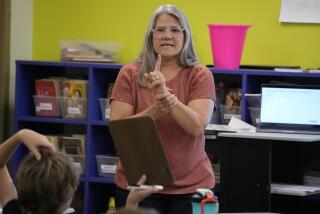The lack of women in math and the sciences
- Share via
Margaret Wertheim takes a far stretch back to Pythagoras in seeking reasons for the present disparity in the numbers of female and male engineers, mathematicians and computer and physical scientists (Opinion, March 30).
Far more harm today is done to the intellectual development of adolescent girls by the advice of school counselors and differential expectations by science and math teachers. Girls also are confronted with the derision of their male peers and the endless trumpeting of sexiness in popular culture as the goal to be attained. It still takes a stubborn, totally self-directed girl to defy those negative pressures. Astronaut Sally Ride and her spine-building cohorts are a blessing to girls who might otherwise succumb and a thumbs-up to those who would survive anyway.
FRIEDA A. STAHL
Physics Professor Emeritus
Cal State L.A.
*
I found an interesting coincidence March 30 when The Times ran an article about the rates of brain growth in children and the resulting IQs at the same time as the Op-Ed article about the place of women in the sciences.
The obvious questions should come up: In the brain-growth study, were there equal numbers of boys and girls studied? If not, why not? How did brain-growth rates differ between the genders? And later on, when IQs were assigned in that study, what were the distributions of females and males from low to high? Where were the high-IQ girls by number or by percentage compared with the boys? After all, we tend to link IQ with math and other competences. And therefore, do we link IQ and math ability with gender?
Did Harvard President Lawrence H. Summers have something in his surmise after all, or was he just guessing on a popular theme?
NATHAN KRAVETZ
Sherman Oaks
*
Wertheim’s list of reasons for the paucity of women in mathematics and sciences missed one: the lure of romance. In the humanities, a girl can dream of love while reading a novel, become emotional in a play, get misty-eyed over a poem. Hard to experience those emotions in a math class.
ART COHEN
Los Angeles






